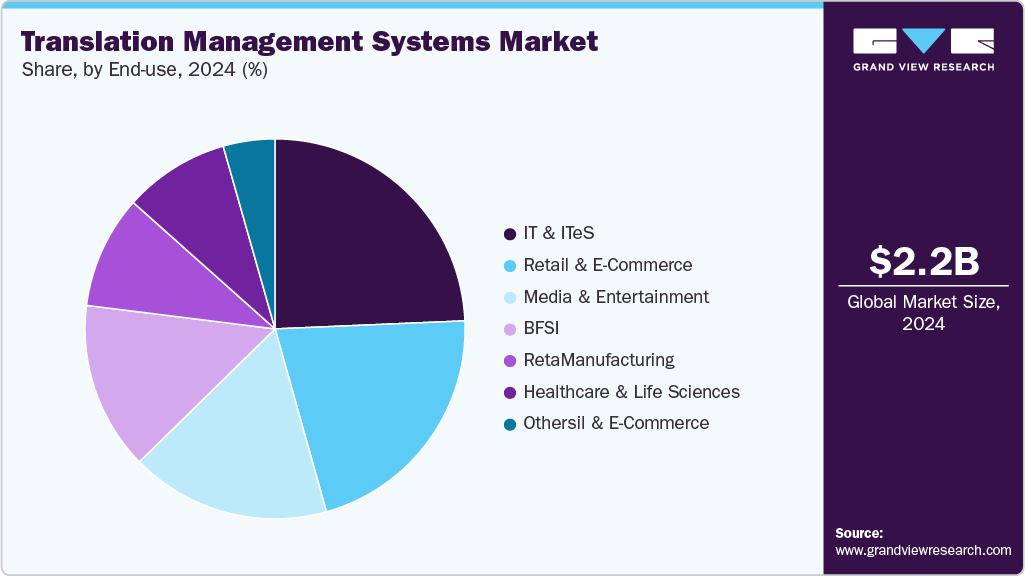Translation Management Systems Market: The Impact of Digital Transformation on Global Business
The global translation management systems (TMS) market was valued at USD 2.16 billion in 2024 and is projected to reach USD 5.47 billion by 2030.
The global translation management systems (TMS) market was valued at USD 2.16 billion in 2024 and is projected to reach USD 5.47 billion by 2030, expanding at a CAGR of 17.2% from 2025 to 2030. This growth is primarily driven by the increasing volume of digital content across platforms, prompting widespread adoption of TMS solutions.
As businesses distribute and manage content across websites, mobile applications, digital advertisements, and social media, they face growing complexity in maintaining multilingual consistency. TMS platforms address this challenge by offering centralized control over translation workflows and integrating with systems such as content management systems (CMS), digital asset management (DAM), and customer relationship management (CRM) tools. These integrations streamline localization processes and help ensure unified brand messaging across all customer-facing channels.

Another key growth driver is the increasing adoption of cloud-based solutions. Cloud TMS platforms provide scalability, global accessibility, and real-time collaboration among translators, reviewers, and project managers. This is especially beneficial for multinational organizations operating in multiple time zones. In addition to reducing infrastructure costs, cloud-based TMS platforms offer seamless updates and compatibility with modern SaaS tools, making them attractive to both large enterprises and small-to-medium businesses seeking localization efficiency.
Order a free sample PDF of the Translation Management Systems Market Intelligence Study, published by Grand View Research.
Key Market Trends & Insights
- Europe led the market in 2024 with a 31.0% revenue share, driven by the region’s strong industrial sectors such as automotive, aerospace, pharmaceuticals, and financial services, where precision in translation and compliance with regulatory standards are critical.
- By component, the software segment accounted for the largest revenue share of 71.6% in 2024. This growth is fueled by the expansion of remote work environments and globally distributed teams, enabling collaborative translation in real-time via centralized platforms.
- By business function, the finance & accounting segment dominated with a 41.85% revenue share in 2024. As the finance sector embraces digital transformation, cloud-based TMS solutions are being adopted to replace manual workflows and enhance operational efficiency.
- By content type, the text-based content segment held the largest share in 2024. The demand for accurate and consistent multilingual text has grown due to omnichannel engagement strategies spanning websites, apps, and chatbots.
- By application, the translation segment captured the largest revenue share in 2024. The increased integration of machine translation (MT) technologies, including AI-powered engines, has enhanced efficiency by providing initial drafts that human translators can refine.
- By end use, the IT & ITeS sector led the market in 2024. The need for fast-paced and continuous localization in software development cycles has driven TMS adoption, with agile methodologies and DevOps practices demanding rapid and accurate translation of updates.
Market Size & Forecast
- 2024 Market Size: USD 2.16 Billion
- 2030 Projected Market Size: USD 5.47 Billion
- CAGR (2025-2030): 17.2%
- Europe: Largest market in 2024
- Asia Pacific: Fastest growing market
Key Companies & Market Share Insights
Several major players and emerging companies are shaping the translation management systems market:
- SAP SE offers the SAP Translation Hub, a cloud-based solution that automates and streamlines translation processes for enterprise applications. It supports multilingual content management, ensuring accurate and scalable translations across regions and languages.
- Google LLC provides the Translation Hub, an enterprise-grade platform that leverages Google’s neural machine translation technology. Supporting translation into 135 languages, the platform integrates human feedback (human-in-the-loop) for enhanced accuracy and allows enterprises to translate large volumes of content with ease.
- TransPerfect is a key emerging player offering GlobalLink, a TMS platform that centralizes localization workflows. It automates key project management steps such as creation, review, and delivery, thereby improving efficiency and reducing time-to-market.
- Acolad Group offers the Acolad Portal, a secure, cloud-based platform for managing multilingual content. With features such as real-time tracking and CMS integration, the portal streamlines large-scale translation projects and supports various file formats under robust data encryption standards.
Key Players
- Acolad Group
- Babylon Software
- Centific
- Google LLC
- LanguageLine Solutions
- Lionbridge
- Localize Corporation
- Microsoft Corporation
- Oracle Corporation
- RWS Group
- SAP SE
- Smartcat
- Transifex
- Translate Plus
- TransPerfect
Explore Horizon Databook – The world's most expansive market intelligence platform developed by Grand View Research.
Conclusion
The global translation management systems market is experiencing robust growth, fueled by increasing digital content proliferation, multilingual business needs, and the demand for operational efficiency. As organizations expand their global footprints, the need for seamless, real-time, and accurate localization becomes critical. Cloud-based TMS platforms, AI-powered translation tools, and integrated workflows are driving this transformation, especially across sectors like IT, finance, and manufacturing.
With Europe currently leading the market and Asia Pacific emerging as the fastest-growing region, the industry is poised for continued innovation and expansion. Major technology players like SAP and Google, along with fast-growing companies like TransPerfect and Acolad Group, are actively shaping the future of translation management through scalable, AI-enhanced platforms that support global communication strategies.